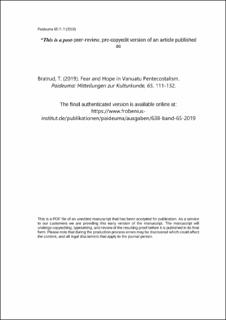Fear and Hope in Vanuatu Pentecostalism
Peer reviewed, Journal article
Accepted version

View/
Date
2019Metadata
Show full item recordCollections
Original version
Paideuma: Mitteilungen zur Kulturkund. 2019, 65, 111-132.Abstract
Abstract. This article discusses the co-creation of fear and hope in the context of the rapid growth of Pentecostal Christianity in Vanuatu in the South Pacific. I take as my starting point how the conjoining of these sentiments operates in three different contexts: first, the growing dissatisfaction with leaders and the status quo in a rural village, the capital Port Vila and the nation as a whole; second, ambivalent ideas about the appropriate road to economic development; and third, the fear of sorcery and various malevolent spirits. By offering a space through which harmful forces can be targeted, I argue that Pentecostal churches in Vanuatu attract those who hope for moral generation, economic betterment and security from dangerous powers. However, by articulating and targeting sometimes new evil forces, Pentecostal activities may also generate new experiences of risk, fear and insecurity as much as offer relief from them. I therefore argue that the cultivation of fear and hope as opposing forces may have the effect whereby the two reinforce rather than encompass each other.